Jeep Compass VS Toyota Mirai – Specs, Efficiency & Price Comparison
Which model is the better choice – the Jeep Compass or the Toyota Mirai? We compare performance (240 HP vs 182 HP), boot capacity (438 L vs 300 L), efficiency (2 L vs ), and of course, the price (34200 £ vs 58700 £).
Find out now which car fits your needs better!
The Jeep Compass (SUV) is powered by a Petrol MHEV or Plugin Hybrid engine and comes with a Automatic transmission. In comparison, the Toyota Mirai (Sedan) features a Hydrogen engine and a Automatic gearbox.
When it comes to boot capacity, the Jeep Compass offers 438 L, while the Toyota Mirai provides 300 L – depending on what matters most to you. If you’re looking for more power, you’ll need to decide whether the 240 HP of the Jeep Compass or the 182 HP of the Toyota Mirai suits your needs better.
There are also differences in efficiency: 2 L vs . In terms of price, the Jeep Compass starts at 34200 £, while the Toyota Mirai is available from 58700 £.
Compare all the key specs now and find out which model fits your lifestyle best!
Jeep Compass
The Jeep Compass combines a rugged aesthetic with modern sophistication, making it a standout choice in the compact SUV segment. Its robust design is complemented by a comfortable interior that offers ample space and cutting-edge technology for a seamless driving experience. Whether tackling urban environments or venturing off-road, the Compass provides versatility and reliability, embodying the adventurous spirit synonymous with the Jeep brand.
details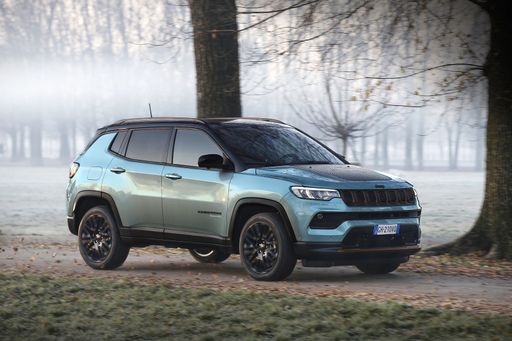 @ media.stellantis.com
@ media.stellantis.com
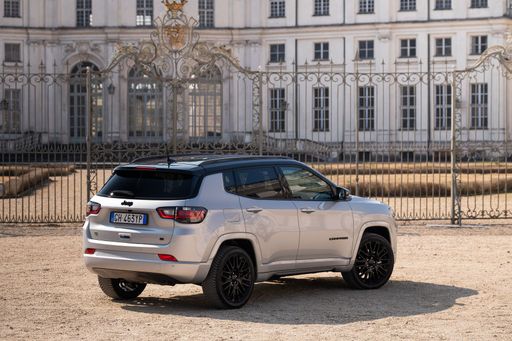 @ media.stellantis.com
@ media.stellantis.com
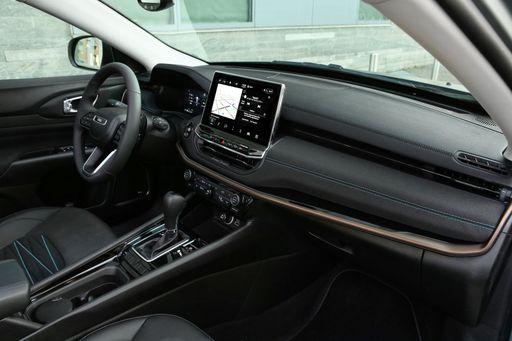 @ media.stellantis.com
@ media.stellantis.com
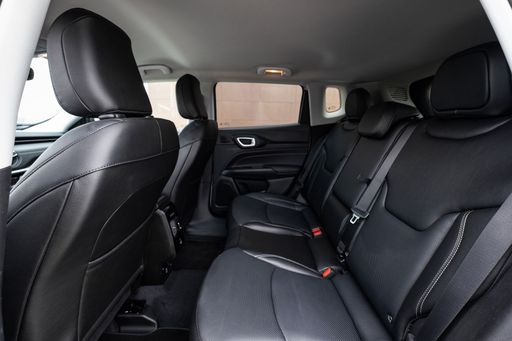 @ media.stellantis.com
@ media.stellantis.com
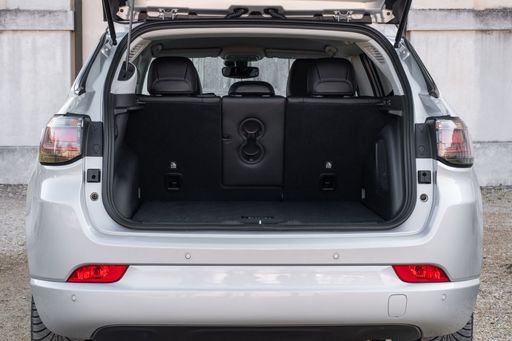 @ media.stellantis.com
@ media.stellantis.com
Toyota Mirai
The Toyota Mirai represents a groundbreaking step in hydrogen fuel cell technology, offering an eco-friendly alternative to traditional petrol engines. Its sleek design and futuristic aesthetic make it a standout on the road, while the interior combines comfort with cutting-edge features. With its impressive range and quick refuelling capabilities, the Mirai is paving the way for the future of sustainable motoring.
details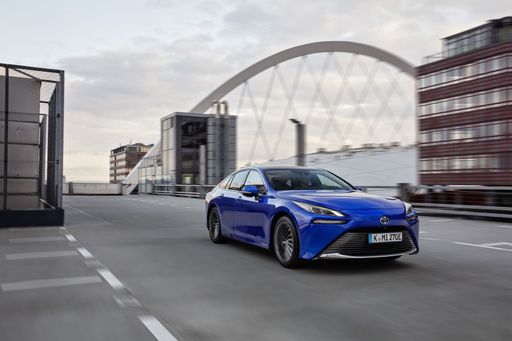 @ Toyota
@ Toyota

|

|
|
|
|
Costs and Consumption |
|
|---|---|
|
Price
34200 - 46900 £
|
Price
58700 - 66700 £
|
|
Consumption L/100km
2 - 5.5 L
|
Consumption L/100km
-
|
|
Consumption kWh/100km
-
|
Consumption kWh/100km
-
|
|
Electric Range
36 km
|
Electric Range
650 km
|
|
Battery Capacity
-
|
Battery Capacity
-
|
|
co2
47 - 124 g/km
|
co2
-
|
|
Fuel tank capacity
36 - 55 L
|
Fuel tank capacity
5 L
|
Dimensions and Body |
|
|---|---|
|
Body Type
SUV
|
Body Type
Sedan
|
|
Seats
5
|
Seats
5
|
|
Doors
5
|
Doors
4
|
|
Curb weight
1575 - 1935 kg
|
Curb weight
1900 - 1930 kg
|
|
Trunk capacity
420 - 438 L
|
Trunk capacity
300 L
|
|
Length
4404 mm
|
Length
4975 mm
|
|
Width
1819 mm
|
Width
1885 mm
|
|
Height
1629 - 1649 mm
|
Height
1470 mm
|
|
Payload
465 - 470 kg
|
Payload
485 - 515 kg
|
Engine and Performance |
|
|---|---|
|
Engine Type
Petrol MHEV, Plugin Hybrid
|
Engine Type
Hydrogen
|
|
Transmission
Automatic
|
Transmission
Automatic
|
|
Transmission Detail
Automat. Schaltgetriebe (Doppelkupplung), Automatikgetriebe
|
Transmission Detail
-
|
|
Drive Type
Front-Wheel Drive, All-Wheel Drive
|
Drive Type
Rear-Wheel Drive
|
|
Power HP
130 - 240 HP
|
Power HP
182 HP
|
|
Acceleration 0-100km/h
7.3 - 10 s
|
Acceleration 0-100km/h
9.20 s
|
|
Max Speed
183 - 200 km/h
|
Max Speed
175 km/h
|
|
Torque
240 Nm
|
Torque
300 Nm
|
|
Number of Cylinders
4
|
Number of Cylinders
-
|
|
Power kW
96 - 177 kW
|
Power kW
134 kW
|
|
Engine capacity
1332 - 1469 cm3
|
Engine capacity
-
|
General |
|
|---|---|
|
Model Year
2024
|
Model Year
2021 - 2022
|
|
CO2 Efficiency Class
D, B
|
CO2 Efficiency Class
-
|
|
Brand
Jeep
|
Brand
Toyota
|
Jeep Compass
Exploring the Jeep Compass: A Modern SUV with Innovative Features
The Jeep Compass continues to challenge the boundaries of what an SUV can be, offering a blend of practicality, efficiency, and rugged appeal. This model, distinguished by its diverse range of powertrains, promises to cater to various needs and preferences. From urban commuting to exploring off-road trails, the Compass delivers with aplomb.
Engine Versatility and Performance
Under the bonnet, the Jeep Compass offers a diverse lineup of engines designed to meet varying driver demands. With options ranging from mild hybrid petrol engines to advanced Plug-in Hybrid Electric Vehicles (PHEVs), the Compass provides both efficiency and power. This impressive engine choice results in power outputs from 130 to 240 PS, ensuring that there is a model suitable for both city driving and more ambitious off-road excursions.
Performance devotees will appreciate the Compass's quick acceleration, clocking 0-100 km/h in as little as 7.3 seconds. Meanwhile, fuel economy remains commendable, with consumption figures between 1.7 to 5.5 litres per 100 kilometres, making the Compass an economical choice for daily driving.
Innovative Hybrid Technology
The Jeep Compass brings cutting-edge hybrid technology to the forefront. The available plug-in hybrid variants offer electric-only driving ranges of up to 53 kilometres, ideal for environmentally conscious urban drivers. This zero-emission capability makes short trips sustainable without compromising on the flexibility offered by the internal combustion engine for longer journeys.
Dynamic Drivetrain Options
One of the main talking points of the Compass is its adaptable drivetrain options, which include both front-wheel drive and all-wheel drive systems. The 4xe PHEV models particularly stand out with their all-wheel drive, providing enhanced stability and traction suitable for varying terrains. Additionally, the automated transmission ensures smooth gear changes and an overall comfortable driving experience.
Design and Comfort
Beyond performance, the Jeep Compass excels in providing a stylish and functional environment. The SUV's dimensions, ranging between 4398 to 4404 mm in length and up to 1874 mm in width, offer ample interior space for both passengers and cargo. The boot space varies from 420 to 438 litres, accommodating the needs of families and adventure-seekers alike.
With seating for five, maximum comfort is assured, thanks to high-quality materials and thoughtfully designed interiors. The Compass integrates advanced technology seamlessly into its cabin, ensuring easy connectivity and an engaging driving experience.
Safety and Efficiency
Safety is paramount in the Jeep Compass, with a range of driver assistance features providing peace of mind. The model adheres to impressive CO2 efficiency standards, boasting a CO2 emission range between 37 and 123 g/km, making it both a responsible and reliable choice.
Furthermore, the Compass offers competitive running costs, with monthly expenses ranging from €1,095 to €1,315, and an average cost per kilometre between 43.8 and 52.6 cents. This cost-effectiveness further underscores the Compass’s value proposition.
Conclusion
Overall, the Jeep Compass stands out as a richly equipped, versatile SUV, ready to tackle urban or off-road challenges. With its blend of powertrain innovations, superior performance, and sophisticated design, it redefines what’s possible in the SUV segment. Whether for efficient city driving or adventurous journeys into the unknown, the Compass is ready to rise to the occasion.
Toyota Mirai
The Future of Driving: Introducing the Toyota Mirai
The Toyota Mirai represents a significant leap forward in automotive innovation, being one of the leading vehicles in the hydrogen fuel cell market. As we continue to search for sustainable transportation solutions, the Mirai stands out with its pioneering technology and exceptional driving features.
Revolutionary Hydrogen Fuel Cell Technology
At the heart of the Toyota Mirai is its groundbreaking hydrogen fuel cell system. Unlike conventional internal combustion engines, the Mirai uses a fuel cell stack to generate electricity through the chemical reaction between hydrogen and oxygen. This process not only powers the car with zero emissions—producing only water vapour as a byproduct—but also delivers a smooth and silent drive.
Technical Specifications and Performance
The Toyota Mirai is designed with performance in mind. It boasts a power output of 182 PS (134 kW) and delivers a robust 300 Nm of torque, allowing it to accelerate from 0 to 100 km/h in just 9.2 seconds. While its top speed is a respectable 175 km/h, it's the Mirai's impressive range that really stands out. The vehicle can travel up to 650 km on a single hydrogen fill-up, making it a practical choice for long-distance travel.
Sophisticated Design and Comfort
Designed as a saloon, the Toyota Mirai combines aesthetic appeal with comfort. Its dimensions—4975 mm in length, 1885 mm in width, and 1470 mm in height—provide a spacious interior for five passengers. The design is sleek and modern, reflecting its advanced engineering. The boot offers 300 litres of storage, suitable for everyday needs.
Advanced Features and Safety
The Toyota Mirai doesn't just excel in propulsion technology; it also includes a range of advanced features to enhance driver comfort and safety. Available in three trims—Advanced, Executive, and Luxury—the Mirai includes state-of-the-art safety systems and infotainment options to ensure a connected and secure driving experience.
Cost and Efficiency
While the price of the Toyota Mirai ranges from €65,990 to €76,290, its monthly running costs—estimated between €1,496 and €1,672—and per kilometre costs of 59.9 to 66.9 cents, reflect the efficient nature of hydrogen-powered vehicles. Considering its innovative technology, the Toyota Mirai offers excellent value for those looking to invest in the future of eco-friendly transport.
The Toyota Mirai: Driving Towards a Sustainable Future
Overall, the Toyota Mirai is more than just a car; it's a vision for the future of sustainable transportation. With its cutting-edge hydrogen fuel cell technology, impressive range, and commitment to zero-emissions driving, the Mirai sets a new standard in environmentally conscious car design. Whether you're an eco-enthusiast or just someone seeking a reliable and technological advanced vehicle, the Toyota Mirai is worth considering.
The prices and data displayed are estimates based on German list prices and may vary by country. This information is not legally binding.
